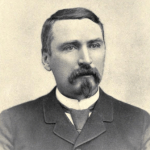
The late Hon. George W. Gorton filled a place in the business and social circles of Soda Springs, and in fact of the entire state of Idaho, which will be vacant as long as his friends and admirers survive, for he was a man of marked individuality, a magnetic man who drew men to him and bound them with bonds of strongest friendship, and a helpful man who was always assisting others over rough places, and those who knew him believed that there was no man like him. Air. Gorton was born at Scranton, Pennsylvania, March 3, 1846, a son of Job P. and Deborah (Sweet) Gorton. His ancestors were English, and the progenitors of his families of Gorton and Sweet located early in Rhode Island, and some of their descendants participated in the Revolutionary struggle of the American colonies. His father and mother were born in Rhode Island and found a new home in Pennsylvania soon after their marriage. They had four children, and Mrs. Gorton died in giving birth to the subject of this sketch. George W. Gorton was educated in the public schools of Scranton, Pennsylvania. He was only seventeen years old in 1863, when the fortunes of the Union cause, in the great struggle for northern and southern supremacy, were darker than at any other time during the war, but realizing how sorely our nation needed men who were willing to risk their lives in defense, and inspired somewhat, perhaps, by the memory of his Revolutionary forefathers, he enlisted in Company K, Eleventh Regiment of Pennsylvania Cavalry. His term of service was from June 17, 1863, to August 17, 1865, when he was honorably discharged and made the recipient of a recommendation by superior officers, in testimony to his gallant conduct on more than one occasion.
Not long after the close of the war, fresh from his service at the front, Mr. Gorton came west, and for a time was associated, as superintendent of salt works and in other confidential relations, with Governor White, of Montana, who had no thought at that time of the high position to which he was destined to be called. This connection continued for five years, and for two years after its termination Mr. Gorton lived at Malad City, Idaho. After busying himself in various ways in the interval, he came to Soda Springs in January 1878. Not long afterward he was appointed receiver of the firm of H. Moore & Company, a mercantile concern then in liquidation, and bought its stock of goods and entered upon a prosperous career as a merchant, which was terminated only by his death, January 6, 1899. His widow and son continue the business, which is one of the most extensive of its kind in the town. During his more than twenty years’ residence in southeastern Idaho, he took a deep interest in its development and prosperity, which he encouraged generously in all ways at his command. He was an influential Republican and served his fellow citizens as county commissioner, county treasurer and county assessor of Bannock County, and as representative of the county in the territorial legislature. He was a prominent Odd Fellow and comrade of the Grand Army of the Republic and had a wide acquaintance with representative men throughout the state, being most highly esteemed by those who knew him. When his party took a position on the financial question which he could not indorse, he embraced what he thought was the best side of the question for the people of his county and state, and as an avowed bimetallist was a leader among leaders as a silver-Republican. To this position he adhered as long as he lived. When he died the people of the entire state felt that they had lost one of their ablest and noblest citizens. He was buried by the Independent Order of Odd Fellows, and his brethren in the order deplored his death and were proud to show every respect to his memory.
Mr. Gorton left a fine home and a comfortable competence to his family. He was married, November 3, 1877, to Miss Leah Waylett, daughter of William Waylett, of Salt Lake City, Utah, and a native of that city. They had eleven children, five daughters and six sons. The daughters all died of diphtheria. The sons survive. Henry C, the eldest, is associated with his mother in the management of their store. The others arc named George W., Jr.; Shoup; Dubois; Jay P., and Eastman K. Shoup and Dubois are twins and were named in honor of Senators George L. Shoup and F. T. Dubois, who were Mr. Gorton’s strong personal friends. Eastman was named in honor of L. C. Eastman, Mr. Gorton’s neighbor, who returned the compliment Mr. Gorton paid him by naming one of his sons Gorton.
